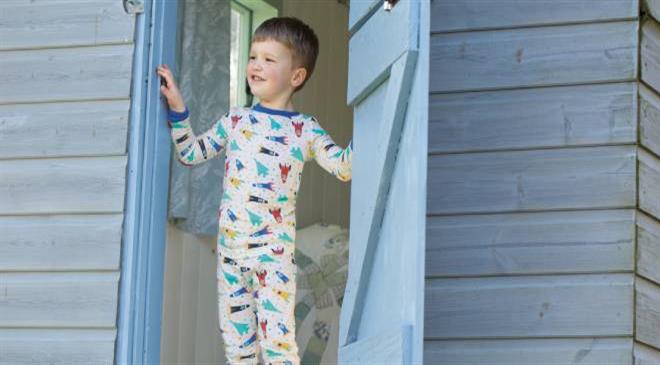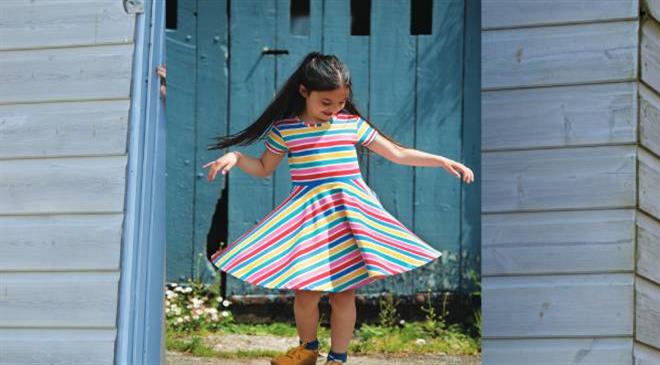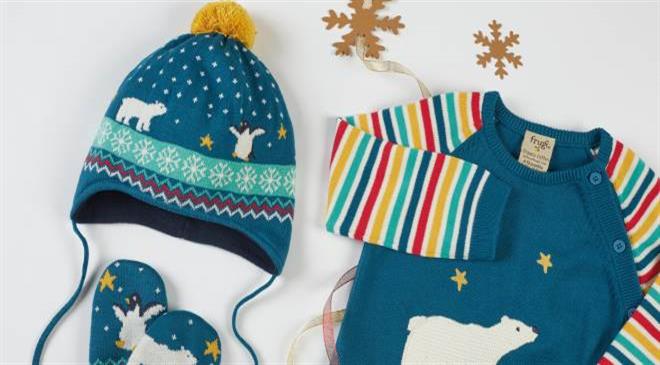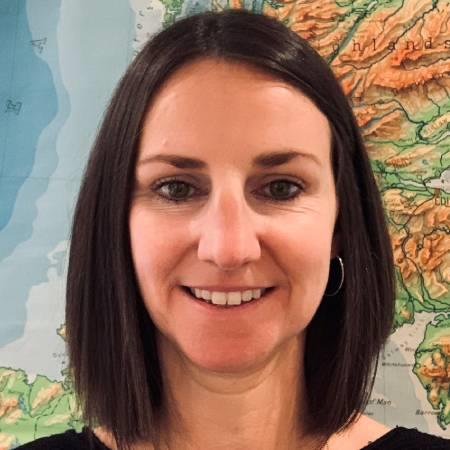In final weeks of going live with new ERP, DTC and B2B website
Founders Lucy and Kurt struggled to find clothing to fit over their son’s cloth-nappied bum and that’s how Frugi, an organic kidswear company, was born in 2004. In an interview with Fibre2Fashion, Lara Smrtnik, Head of Marketing at Frugi, discusses the brand’s success story, its recent acquisitions and partnerships, and the new ways the company is employing to engage customers in current times.
What factors have majorly contributed to your success story? How has the brand progressed since its inception in 2004?
Our brand was founded as a family-run business in Cornwall. Sticking to our roots, we are still Cornish-based but with a global e-commerce business with further distribution through 500 online and in-store retailers in 30 countries worldwide. This week we celebrated our first Frugi retail store opening in Clarks Village in Somerset, which provides a much sought after physical brand experience.
In the UK, our distribution has recently extended to M&S online with strong growth in John Lewis, Next, Zalando and other major retailers. Our biggest market outside the UK is Germany, with ambitions to continue to expand our global presence in 2022 and beyond.
This growth has been accelerated by the global consumer shift in spending towards sustainable, ethical products. According to recent research from Kantar, eight out of ten consumers say they have switched or boycotted brands due to their poor environmental reputation. As a pioneer in eco-friendly products using only GOTS certified organic cotton and recycled materials, Frugi continues to offer customers clothing and accessories that puts the planet first.
We have a wider internal mission statement within our group to ‘inspire the next generation of eco heroes by providing sustainable clothes and reusable products to enable families and communities to enjoy quality time together, in a way that respects our planet. We also put our money where our mouth is and donate 1% of turnover to brilliant charities and initiatives such as Eco-Schools, which puts sustainability and the outdoors at the very heart of the curriculum.
Another contributing factor to Frugi’s success is being recognised for its sustainable roots by industry leaders and the royal circuit. Earning two Queen’s Awards for Enterprise for Sustainable Development and International Trade in 2020, these highly competitive awards are the most prestigious awards for UK businesses. Since the Awards’ inception in 1965, over 7000 companies have won a Queen’s Award. In addition, Frugi Founder Lucy Jewson was awarded an MBE in the 2020 Queens Honours for her services to ethical clothing design and in July 2021 Frugi also won a gold BOOM Award from the Soil Association, recognising their commitment to organic cotton production.
Although the current economic climate has been and will remain a challenge, the strength of the Frugi community and increasing interest in our core values, of putting people and the planet first, has helped support the growth of our business over the last year.
How many collections in kid’s clothing do you come up with in a year?
We have 2 seasons a year – Spring / Summer and Autumn / Winter. In addition to the two main seasons, we also introduce a transitional range ahead of each season. In Spring / Summer 22--this will be an active and loungewear collection, available from early January.
Do you notice any change in kids’ clothing choices posts the pandemic?
In the early part of the pandemic, like many retailers, Frugi increased its focus on comfortable sustainable casualwear at home for adults and children, such as leggings, t-shirts and pyjamas, as parents were buying more casual clothing for children’s home-schooling who were not wearing school uniform. Frugi also saw a 300 per cent growth in reusable nappy products and reported an increase of 51 per cent in online sales for the 7 months from June to the year ended December 2020 as a result of the pandemic and online buying.
The pandemic also had a broader effect on consumer spending worldwide by reinforcing the impact that we are all having on our planet. As a result, we are seeing a welcome increase in the interest and awareness of sustainable and ethical issues, which ultimately helps our business and means we are well-positioned to reinforce our sustainable and ethical status.
How successfully has Frugi expanded its product portfolio over the years?
In early 2020, Frugi acquired Glasgow-based reusable nappy brand TotsBots and its sister brand, Bloom & Nora, both leading brands in the burgeoning reusable products sector. This acquisition allowed Frugi to expand its portfolio whilst remaining true to the founding planet-friendly principles.
Expanding the business in this way allows Frugi to further capitalise on shifting consumer behaviours towards a more ethical and sustainable mindset. We work very closely across the brand portfolio which provides sustainable products for several life stages within the family, such as our Frugi Bloom maternity, breastfeeding and beyond clothing range for mums.

How is your partnership with The Little Loop and acquisition of TotsBots going to help you further your business? What were the reasons for you to come together with these brands on the first hand?
Our partnership with thelittleloop seemed like a natural step for us. Carbon emissions from clothing must be halved if we are to limit global warming to 1.5’C. This can’t be done if we don’t vastly increase the life cycle of every garment and renting does just that, significantly reducing its environmental impact. With 122 Frugi styles to choose from at thelittleloop, their proposition allows parents to receive a selection of clothes that fit their child via a rental wardrobe subscription service. Once these clothes are outgrown or no longer wanted, they can be returned or swapped. Swapping clothes instead of buying can save over £900 per child per year! And because we use organic cotton, our clothes are made to last. Our partnership with theLittleloop is helping us to further extend the lifespan of these clothes, which have been and will continue to be loved by future generations.
The acquisition of TotsBots in early 2020 was an opportunity to expand our portfolio while remaining true to our core ethos. Furthermore, having its first significant brand refresh and investment in marketing in 20 years, Frugi aims to propel the TotsBots brand within the rapidly growing reusable sector. On a mission to make premium reusable nappies in the kindest way possible to our planet, TotsBots is hoping to inspire and enable more parents to make choices that have a positive environmental impact for the future of their children. The UK nappy market currently has a 90/10 split between disposable and reusable product demand, but this divide is gradually becoming smaller due to more and more parents looking to cut back on waste going to landfill and to save money in the long run.
Over the years TotsBots has grown steadily to become one of the UK’s leading reusable nappy brands and has invested resources in product development and innovation which has been key to the brand’s success. In 2003, TotsBots revolutionised the industry by developing an eco-friendly and ultra-performing reusable nappy made from bamboo which was the first-ever reusable nappy to win the ‘Mother & Baby’ Gold Award. Furthermore, TotsBots was the first brand to make the waterproof fabric on the exterior of their nappies from recycled polyester yarn, diverting two plastic bottles on average from going to landfill per nappy. These environmental credentials have struck a chord with consumers in the past and have undoubtedly helped the brand to grow where it is today.
Now that there is a gradual recovery from the pandemic, what are the consumer engagement strategies and innovation you are focusing on to increase sale of your products?
In terms of consumer engagement, we will continue our investment in digital marketing as a key part of our new customer acquisition strategy. In addition to this, we have increased investment in brand awareness campaigns. In October 2021 we launched our first ever TV ad, which aired on All4, as well as on digital upper funnels channels such as YouTube and across social media. This was a first for the brand and was exciting to see the positive reaction coming from a new audience.
Furthermore, in December 2021, we opened our first permanent retail store in Clarks Village, Somerset, and it is already a welcome addition to the area. This first store for Frugi not only sells sustainable clothing and accessories, but it also provides a fun learning experience for everyone, especially children, who are encouraged to interact with special panels where they can discover various brand themes, such as how organic cotton is made or why reusable products are better for our planet. Big and little children alike can spin a wheel to reveal clues on how to be an eco-hero, turn cogs to see how much electricity they can generate, or stand next to an organic cotton height chart to see how tall they are in Frugi t-shirts. There is even a panel for budding artists to colour in their favourite Frugi character. The store design uses a modular framework with divided space to promote exploration and interaction with the panels at the back. The design is fully interchangeable and can flex into high-density stockholding at sale times and flex again into telling even more of the Frugi brand story at other times. Like a big jigsaw, the wall and floor fixtures and fittings are all designed so the shop fit can be easily moved and reproduced.
As an online-first business, we have worked to meet increased demand arising from the pandemic. As such, In July of this year, we opened our second warehouse, doubling the square footage we have available. We also set up a 3PL in the Netherlands in 2020.
What role is technology and social media playing in keeping your business afloat in current times?
We are in the final weeks of going live with a new ERP (Netsuite) and a new DTC and B2B website (Magento). These are significant investments for the business and will give a strong foundation for our future international growth.
In terms of social media, we have a dedicated team who create and broadcast engaging content across various channels. We have made a conscious switch to include more video in our comms on both owned and earned channels, and are seeing far higher engagement with these pieces than static imagery. In 2022, we will expand our presence across a wider channel mix, so we can ensure we attract an ever-growing new audience.
Furthermore, our dedicated in-house PR team have worked to build a strong base of over 500 brand ambassadors in the UK alone, as well as many in Europe and the US, who are influencing the way many parents buy their clothes for their young ones.
What steps do you take to ensure that the raw materials used and even designs are child-sleep-friendly and eco-friendly? Does sustainability add in to your pricing points?
Frugi uses 100 per cent certified GOTS organic cotton for 90 per cent of our clothes, which give full breathability and comfort for the child who is wearing them. This strict certification by the Soil Association means that Frugi is made with organic fibres that have met rigorous production standards. This industry-recognised certification provides total visibility and traceability through the entire supply chain from the farmer through to the finished item.
GOTS works on 5 main principles:
•It is committed to combatting climate change by using natural farming methods instead of fossil fuel-based fertilisers to build healthier soil that is better at storing carbon and the use of natural fertilisers reduce the pollution to rivers, lakes and the water table
•It saves water – soils that are high in carbon and organic matter are better at holding water than soils maintained by the use of artificial, chemical inputs. Organic cotton production uses 91 per cent less water to grow the crop than conventional cotton growth
•It helps the farmers and the local communities to maintain a more balanced system and encourages biodiversity by growing other food crops alongside the cotton, which also boosts local income and provides a more stable, diverse and accessible food supply
•By banning the use of genetically modified (GM) seeds, the farmers regain control from reliance on GM companies by using their own seeds from previous crops
•It eliminates harmful pesticides which can damage ecosystems, poison waterways and potentially harm the workers.
This means that everyone involved in the process--farmers, ginners, spinners, knitting/weaving, dyeing and printing, and garment manufacturing--is audited and certified by GOTS to ensure all the environmental and socio-economic requirements of the Global Organic Textile standard are followed.
Encouraging customers to reduce, reuse and recycle, the remaining 10 per cent of Frugi products are made from old polyethylene (PET) plastic bottles that have been spun into yarn to make a durable, waterproof fabric for outerwear, accessories, and swimwear. Mintel reports that by extending the life of clothing by an extra nine months it can reduce carbon, waste, and water footprints by around 20-30 per cent each.. Frugi is actively incorporating longevity and practicality into their clothes. For instance, their new Snow and Ski jacket has adjustable sleeves that can grow an extra three sizes. Once the child has outgrown it, the sleeves can be shortened to start a new life with a younger wearer.
In 2020, because most single-use plastic hangers end up in landfills, Frugi eliminated all plastic hangers from all operations and now only uses FSC certified cardboard made from recycled materials. Online customers receive their purchases in 100 per cent GM-free corn starch bags that can be placed on home compost heaps, sent to an industrial composting facility, or recycled (depending on local facilities). And for those special gift purchases, customers have the choice to gift wrap in a colourful Furoshiki organic cloth wrap, a nice eco-friendly touch for special occasions, and help cut back on tonnes of paper waste during the gifting season.
Frugi’s prices reflect the high-quality materials that we use--we want our customers to buy ethical and sustainable clothes that are made to last.

What do you see as some of the main problems regarding sustainable fashion facing the industry today? What do you think is the best way forward?
There has been a lot of attention put on what materials fashion brands are using as part of their production. We believe that there is always space to learn when it comes to sourcing innovative, sustainable materials and finding new and more planet-friendly ways of production; the key to growing as a brand is to continue learning and adapting to new technologies and developments. According to a report by Genomatica, a problem for sustainable fashion is consumer confusion as to what sustainably-made apparel really means and what to look for. Their 2021 survey revealed that 42 per cent admitted to not understanding what sustainable apparel entails with 51 per cent believing that companies use greenwashing marketing terms. What seems to be lacking in the garment industry is clear and rigorous terminology that’s easy for consumers to comprehend and recognise so that they can make better choices for their sustainable purchases.
Unlike some garment brands that greenwash their claims to provide unfounded and vague eco-friendly credibility, Frugi’s core ethos has and will always be to protect the planet we all play on. For its outerwear and accessories, Frugi uses post-consumer recycled polyester, which comes from plastic bottles and is currently still one of the best ways the fashion industry can help to both divert PET bottles from landfills, which causes soil contamination and water pollution, and to reduce our dependence on petroleum-based raw materials. Until there is a long term and viable solution to the growing problem of single-use plastics, and this may hopefully happen sooner than later, using yarns made from recycled products, whether plastic bottles for polyester or cotton from old clothes is more sustainable for the fashion industry than a reliance on virgin yarn. Recycled polyester uses up to 59 per cent less energy to produce than virgin polyester and CO2 emissions are reduced by 32 per cent--this makes this yarn a much better option than conventional, virgin fibres.
This does not mean that the Frugi savvy production team are not looking to incorporate or develop an even better option for our garments and products in the future. Frugi is constantly innovating and moving ahead to ensure we use the latest sustainable fabrics available on the market today.
What's next on the cards? What new announcements in pipeline?
Despite already operating in 30 countries, we have lots of opportunities for further growth within Germany and the rest of Europe, as well as expanding our footprint further afield. We have lots of exciting plans in the pipeline, so watch this space…!

How does your supply chain work? Where are the raw materials sourced from?
We have factories around the world in India, Turkey, Portugal, China and Sri Lanka, as well as closer to home in Glasgow, and have always worked closely with our supply partners, ensuring that every part of the chain is ethical. Ever since the birth of our brand we have been a part of the Global Organic Textile Standard (GOTS), which means that for our organic cotton products we only work with suppliers who are GOTS accredited, this means from the seed to the finished garment every stage of the cycle is regulated and traceable. We believe in strong relationships, not only with our direct manufacturers but in supporting each relationship down the chain so that everyone, from the farmer up, is looked after. This has been even more important over the last two years, as the effects of Covid have been felt the world over, and more so in some of the more remote areas of India, where most of our cotton is grown.
So building and maintaining strong relationships is of utmost importance to us, as without the farmers we would have no cotton to make our products.
Because the desire within the fashion industry for organic fabrics is increasing, the pressure on the source of cotton is growing, and the demand will soon overtake the supply. We are looking for solutions to this problem, including diversifying our raw materials. As cotton is so durable and is the most significant material in our products, we are looking at both recycled cotton and in conversion cotton projects. In conversion is a programme that supports the farmers who want to move from conventional cotton growth into organic farming.
Well in advance of each season we look at our projected cotton consumption and work closely with our supply partners to book the yarns ahead of time, this way we know that the mills and the farmers know what we want and they can be sure of orders, sometimes before that season’s crops are sewn.
We are also starting to look at how we can better work with the farmers on seed to fibre schemes and to set up seed programmes to allow us to directly invest in the annual harvests.




